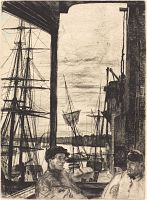Rotherhithe | ||
| Number: | 70 | |
| Date: | 1860 | |
| Medium: | etching and drypoint | |
| Size: | 278 x 203 mm | |
| Signed: | 'Whistler' at lower left | |
| Inscribed: | '1860.' at lower left | |
| Set/Publication: | 'Thames Set', 1871 | |
| No. of States: | 6 | |
| Known impressions: | 118 | |
| Catalogues: | K.66; M.66; T.41; W.60 | |
| Impressions taken from this plate (118) | ||
STATE
Six states are known before cancellation.
State 1

Signed 'Whistler, 1860' at lower left, on the railing.
The composition is complete. The hull of the boat with partly furled sail in the centre of the foreground is not drawn in; the coat and hand of the man at right are indicated with a few lines.
State 2

There are a lot of dots, possibly from corrosion, in the sky at upper right.
In many impressions the drypoint in the sky is fainter than in the impression reproduced.
State 3

Drypoint lines shade the deck, bow and bowsprit of the boat with partly-furled sail in the centre, between the two men, and the interior of the rowboat to left of it; the men's hands and coats are redrawn and shaded in drypoint; a few diagonal lines cross over the pipe of the man at left; drypoint lines are added in the sky, particularly along the horizon and behind the ships' rigging.
State 4

Strong diagonal lines are added on the chest of the man at left; short drypoint lines are added in a roughly triangular area to left of the sailing ship's bowsprit, between the two men.
State 5

Fine drypoint shading crosses the curving shading on the bows of the sailing ship between the two men.
In the impression reproduced, there is a repaired tear or printer's crease that extends into the image at centre left.
State 6

Diagonal drypoint lines augment the shading across the chest and pipe of the man on the left.
Published in this state in the 'Thames Set'.
The drypoint varies in strength according to the state of the burr and inking of different impressions; in addition it is possible the drypoint was reinforced when the plate was printed for F. Keppel & Co.
State 6 (cancelled)

Cancelled with four ruled lines making a large diamond touching each edge, a dotted line in a rough circle, and eight small scattered crosses.
